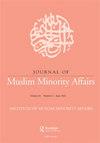“承认斋月开始 … ”: 2001年至2020年美国国会关于斋月的决议
IF 0.4
0 RELIGION
引用次数: 0
摘要
摘要本文追溯了自2001年以来,美国国会几乎每年都会通过简单决议的历史,以承认斋月的开始,并向美国和全球的穆斯林致以良好的祝愿。其中只有一个通过了。这些象征性的决议很少被研究,与媒体对白宫开斋节和总统斋月问候的关注形成鲜明对比。这篇文章利用国会的消息来源认为,这些象征性的决议尽管取得了有限的成功,但为理解9/11后国会承认穆斯林为美国宗教少数群体的努力提供了一个重要的视角。这些斋月决议的影响在于,它们试图在全国范围内承认少数宗教团体——这一努力既有包容性,也有争议。总的来说,国会的决议和辩论为研究当代美国的美国穆斯林和其他宗教少数群体提供了富有成果的来源。本文章由计算机程序翻译,如有差异,请以英文原文为准。
“Recognizing the Commencement of Ramadan … ”: U.S. Congressional Resolutions on Ramadan, 2001–2020
Abstract This article traces the history of the simple resolutions introduced in the United States Congress almost annually since 2001 to recognize the commencement of Ramadan, and to offer good wishes to Muslims in the United States and globally. Only one of these has passed. These symbolic resolutions have been little studied, in contrast to media attention on White House iftars and presidential Ramadan greetings. Using Congressional sources, this article argues that these symbolic resolutions, despite their limited success, offer an important lens for understanding a post-9/11 Congressional effort to recognize Muslims as an American religious minority community. The impact of these Ramadan resolutions lies in their attempt to grant national recognition to a minority religious community—an effort that has been both inclusive and contentious. Overall, Congressional resolutions and debates offer a fruitful source for scholarship on American Muslims and other religious minorities in the contemporary United States.
求助全文
通过发布文献求助,成功后即可免费获取论文全文。
去求助
来源期刊

Journal of Muslim Minority Affairs
RELIGION-
CiteScore
1.40
自引率
0.00%
发文量
31
期刊介绍:
Journal of Muslim Minority Affairs is a peer reviewed research journal produced by the Institute of Muslim Minority Affairs (IMMA) as part of its publication programme. Published since 1979, the journalhas firmly established itself as a highly respected and widely acclaimed academic and scholarly publication providing accurate, reliable and objective information. Journal of Muslim Minority Affairs provides a forum for frank but responsible discussion of issues relating to the life of Muslims in non-Muslim societies. The journalhas become increasingly influential as the subject of Muslim minorities has acquired added significance. About 500 million Muslims, fully one third of the world Muslim population of 1.5 billion, live as minorities in 149 countries around the globe. Even as minorities they form significant communities within their countries of residence. What kind of life do they live? What are their social, political and economic problems? How do they perceive their strengths and weakness? What above all, is their future in Islam and in the communities of their residence? The journal explores these and similar questions from the Muslim and international point of view in a serious and responsible manner.
 求助内容:
求助内容: 应助结果提醒方式:
应助结果提醒方式:


